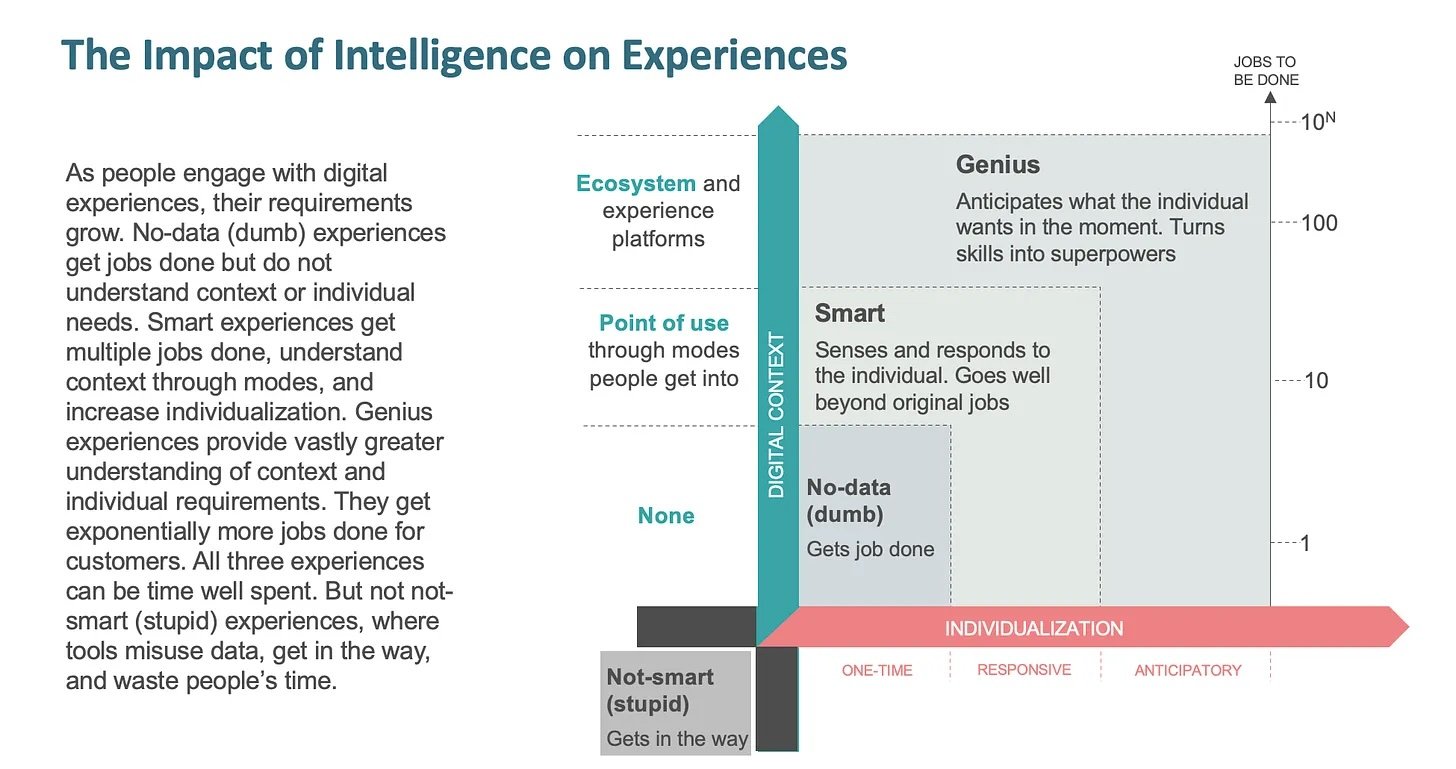How Expectations Change When JTBDs Include Generative AI
The Intelligent Amplifier
Obviously, people’s expectations change because of smart and genius technologies, but I wonder if companies realize just how dramatic the change is.
As people engage with digital experiences, their requirements grow. If there is no data sharing between the customer and the solution, their expectations grow incrementally. They want the experience to be better next time, but they recognize the limitations of tools that do not offer any level of intelligence. Consumers today often refer to solutions that don’t include data or intelligence as ‘dumb’ solutions. It’s not a pejorative. It just means that the solution wasn’t designed for smart customization. And as long as the solution gets the specific job done that the customer needs it to do, they are satisfied.
If a watch tells time, then the watch gets the job done.
But if the solution has sensors, data, or digital technology it is assumed to be ‘smart.’ Then, the customer expects the solution to do far more than just the original job to be done. A smart watch can tell time. Of course, but that is hardly why people buy smart watches. They want to do so much more. And most smart watches deliver. You can chat, make phone calls, track your heart rate, check apps; the actual number of things that people can do on a smart watch is amazing. But it’s also expected.
If a smart watch can do at least 100 things, it’s getting the whole job done.
We all understand the distinction between smart and dumb when it comes to intelligent solutions. We’ve been living in a smart world for nigh on fifteen years now. What companies don’t quite understand yet is what happens when generative AI becomes pervasive. What happens to customer expectations when a digital platform can pretty much think for itself?
People’s expectations increase dramatically for solutions that include artificial intelligence. Now, if you can only do 100 things for your customer, you are wasting their time. Joe Pine and I have been exploring this topic for some time. We recently published the framework below in an HBR article, Are Your Digital Platforms Wasting Your Customers’ Time.
The article looks at the impact of ‘genius experience platforms’ on time value. The framework above is more specifically focused on jobs to be done. As you can see, the more intelligence that a solution has in it, the more jobs the customer expects the solution to do for them. Genius solutions are actually experience platforms that work well as an ecosystem for many other solutions. They anticipate what the individual wants done in the moment (or for the situation). And they turn skills people have or want to have into superpowers.
If a smart watch is part of a genius experience platform, there is no limit to the number of jobs the customer can get done. And that’s the whole job.
On the other hand, if the company designs solutions that get in the way of people getting the job done, then the solution is, again, using the customer’s vernacular, ‘stupid.’ Dumb solutions that don’t get one job done well are stupid. Smart solutions that use data badly are stupid. And genius platforms that hallucinate or have bad AI are stupid.
Thinking About the Whole Intelligent Job
Artificial Intelligence doesn’t, in and of itself, make most companies money. In fact, there are huge risks for many companies that deploy costly generative AI because people only want a few genius platforms. Consider the challenges that Amazon’s Alexa faces.
In a recent Wall Street Journal podcast, the Journal’s Kate Linebaugh and Dana Mattioli point out that Alexa, the AI that we all know because we trigger it regularly in normal conversations, doesn’t make money for Amazon. Amazon has invested heavily in the product. Over 500 million homes have an Echo device in them. Over 25 billion dollars have been lost by Amazon building out the infrastructure. Amazon sells Echo devices at below cost in hopes that people will adopt Alexa as their preferred tool for all kinds of tasks.
But it’s not working. At least not so far.
We will see how Alexa does once Amazon completes the rollout of generative AI, but for now, it’s still a money loser for the company. And we must ask ourselves, why?
I believe it’s because Alexa cannot do whole jobs for customers. Alexa finds information and automates tasks. Because its only consistent interface is voice interaction, people cannot easily accomplish certain information and automation tasks. Not only is there the problem of Alexa misunderstanding a request, which all voice AIs struggle with, but people must remember all of the ‘skills’ that Alexa has. And that’s just the beginning of the challenge that customers face.
To get the whole genius job to be done includes at least these elements (and probably more):
Both visual and voice interfaces. People still need dashboards. They need smart queues. Don’t force them to only use voice.
The ability to anticipate what the customer is likely to want next. Part of the reason I started a book with a chapter on situational markets was to share examples of how to anticipate needs properly. Anticipating situations is critical to genius adoption.
The ability to turn customer skills into superpowers. People hire genius tools to dramatically improve their performance. They don’t need generative AI to close the garage for them. They need genius platforms to fully orchestrate their home life system.
Brilliant execution. People want genius platforms to be able to accomplish thousands of things for them brilliantly.
These are not people’s expectations for smart solutions. (Remember, there’s a distinction between smart solutions and genius solutions.) And many companies would be wise to temper customer expectations. Promise smart as you implement genius.
With genius platforms doing so many new things for customers, it’s important to ask what impact intelligence will have on other companies’ business models. If most people can ask ChatGPT to help them create a legal will or a divorce decree, then what exactly will lawyers be doing? If the genius platforms that I sign up for can plan my next vacation and even book the trip, do I care about the online experience of hotels, cruise companies, and airlines? Doesn’t the genius experience platform become the intermediary between me and these experiences?
Experience strategists need to understand the whole job the customer needs done so that they can keep the customer engaged with the company. Booking a flight may not be the starting point for airlines when genius solutions scale up. Moreover, the customer may not be interested in engaging with the airline if the airline can’t improve the customer’s overall personal performance, like genius experience platforms do.
Now, not every company can do the whole job, or should. After having lived through the ‘mobile first’ business struggles, we all know that there will be winners and losers in the intelligence wars. What most companies will find is that to thrive, they must learn how to be a role player in people’s lives. That is, they won’t do the whole job for the customer, but they will understand the whole job so that they can play their role better than anyone else.
By role players, I mean that many companies will become specialists. They will do something that no other company can do quite so well. But they will hire experience strategy generalists to help ensure that what they do fits into life systems of those they serve. Experience strategy generalists won’t be focused on best practices within a category—like best practices in healthcare or experience strategy. Generalists will be focused on the holistic understanding of people’s lives. Specialists will be focused on aligning company abilities with intelligence in a way that amplifies customer abilities. (These principles pertain to ‘employee work systems’ and ‘b2b systems’ too.)
Working together, generalists and specialists will help companies carve out a realistic business model that gets many, many more jobs done for customers.
Amazon does not understand life systems. It is another reason why Alexa doesn’t quite fit into people’s lives. Perhaps the most important. Amazon sees Alexa as an almost magical solution for automation. They have chosen to be a general automation platform rather than a specialist on someone else’s platform. Currently, they are preparing to launch generative AI, which will dramatically change their capabilities and people’s expectations. If they figure out how to monetize the platform, they will win big. But if they fail, it will be because people have not integrated the platform into their lives.
Both Joe and I believe that only a few companies will be genius experience platform creators. The rest of us will be specialists who understand and can deliver experiences through intelligent platforms because we understand our role, we do some things better than anyone else, and we fit into people’s life systems.
Want to learn more? Reach out to us HERE
Dave Norton, Ph.D., is the founder and principal of Stone Mantel, a research-led consultancy at the forefront of customer and employee experience strategy.
Click here to Subscribe for free to receive new posts and support my work.


